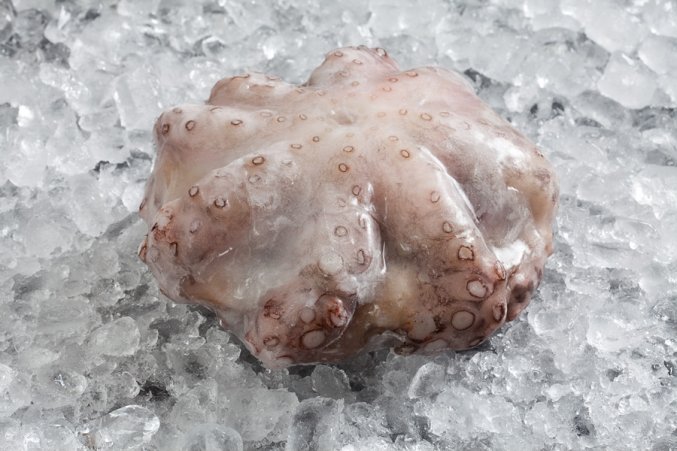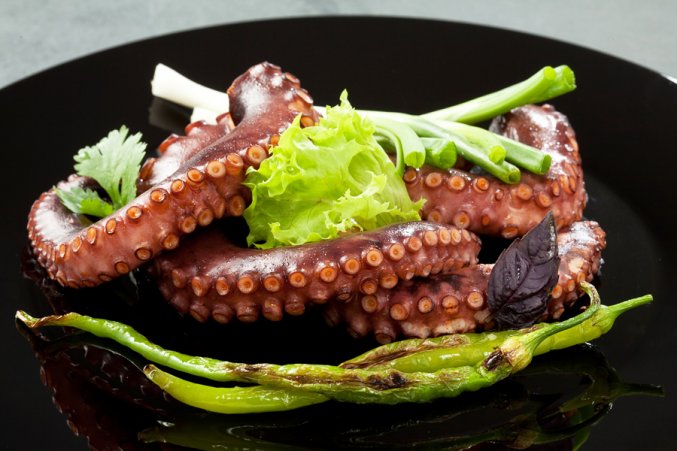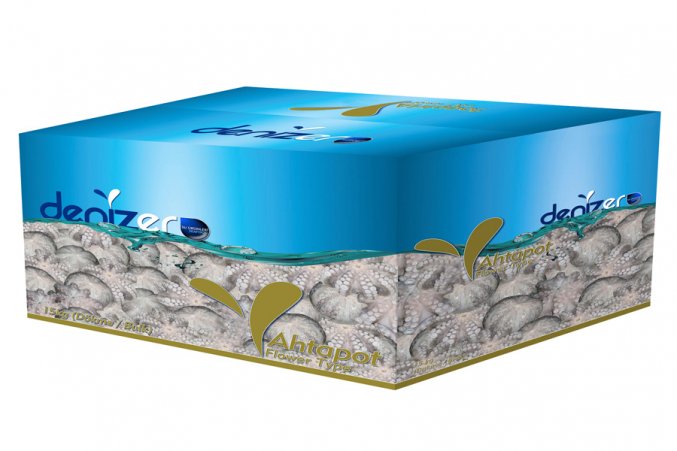Flowered Common Octopus
This is a Cephalopod species living in deep waters and it is most preferred one in the world. They can be found all waters of the world including the tropical ones. In order to find better environment conditions and spawning, they consistently immigrate. It is catched by hook, longline, trap, harpoon and trawl.
Octopus is one of the seafood products which we are used to consume fresh has an important market share as frozen and processed. It is sold as ready-salad.
Product Description
| Product name | Denizer Deep Frozen Flowered Octopus 15 kg |
| Latin name | Octopus vulgaris |
|
External barcode |
1-2: 8680539205200 2-3:8680539205217 3-4: 8680539205224 |
|
Internal barcode |
1-2: - 2-3: - 3-4: - |
| Size | 1-2 kg, 2-3 kg, 3-4 kg / Size before glazing √ / Size after glazing |
|
Product description |
After catching, octopus is graded, tentacules of whole octopus are turned down as a flower without processing and freezed immediately. After freezing, the product is glazed and packed IWP. |
| Freezing type | IQF (Individual Quick Freezer) |
| Packing type | 15 kg IWP (Individual Wrapped Pack), bulk |
| Ingredients | Octopus (90%), water (10%) |
| Production type | Farmed / Catch √ (FAO : 71) / Value added |
| Origin | Indonesia |
|
Units per package |
1-2 kg: 10 pcs/15 kg 2-3 kg: 6 pcs/15 kg 3-4 kg: 4 pcs/15 kg |
| Glazing rate | 10% |
| Product type | Whole octopus |
| Broken pieces | Max 1 piece/15 kg |
| Appearence | Specific skin color and appearence |
| Smell | Specific smell |
| Taste | Specific, not bitter or sour, natural taste |
| Texture | Strict, not dry |
| Average weight | 1-2: 1650 g 2-3: 2475 g 3-4: 3550 g |
| Shelf life | After production date, first 24 months |
| Additives | No chemical |
| Outer package | Min 4 colored printing microwave corrugated cardboard box (PAP) (31x47x35 cm) |
| Inner package | PE individual bag |
|
Packing criteria |
The total migration value of components of plastic substances and materials to foodstuff, per square decimeter surface area of substance or material can not be more than 10 mgs. This value is defined as the limit of total migration of plastic substance and materials (mg/dm2). |
|
Storage conditions |
Should transport and storage at min -18°C. Transportation should be without contamination and complete with no break of cold chain. |
Nutrition facts
| Energy (kcal/100 g) | 160 |
| Fat (g/100 g) | 0 |
| Protein (g/100 g) | 30 |
| Cholesterol (mg/100g) | 95 |
| Na (mg/100g) | 460 |
| Carbonhydrate (mg/100g) | 4 |
| Vit A (%/100 g) | 6 |
| Vit C (%/100 g) | 15 |
| Ca (%/100 g) | 10 |
| Fe (%/100 g) | 50 |
| Omega 3 (g/100 g) | 0 |
Chemical Parameters
| Hg (mg/kg) | 0,5 |
| Cd (mg/kg) | 1 |
| Pb (mg/kg wet weight) | 1 |
| Total max dioxins (pg/g wet weight) |
3,5 |
| Total max dioxins and dioxin like PCBs (pg/g wet weight) |
6,5 |
| Total PCB28, PCB52, PCB101, PCB138, PCB153 and PCB180 (ng/g wet weight) |
75 |
Microbiological Parameters
| Histamin (mg/kg) | 100-200 |
| Salmonella spp(g-ml) | - |
| Listeria monocytogenes (g-ml) | - |
Legal Criteria
| GKGM Regulation on water intended for human consumption |
| GKGM Regulation on microbiological criteria |
| GKGM Regulation on contaminants |
| GKGM Regulation on labelling |
| GKGM Regulation on packaging waste control |
| GKGM Statement of plastic materials in contact with foodstuffs |
| Turkish Food Codex Regulation |
Determination of Net Weight
| Apparatus |
| For packages up to 5 pounds (2.27 kg), use scale of adequate capacity with sensitivity of 0.01 oz. (0.28 g). |
| For packages over 5 pounds (2.27 kg), use scale of adequate capacity with sensitivity of 0.025 oz. (0-71 g). |
| Procedure |
| Set scale on firm support and level. Adjust 0 load indicator or rest point and check sensitivity. Remove package from low temperature storage, remove frost and ice from outside of package, and weigh immediately (W). Open package; remove contents, including any product particles and frost crystals. Air-dry empty package at room temperature and weigh (E). Weight of contents=W-E. |
| *Acc to AOAC offical method 963.26 net contents of frozen food containers-unglazed foods |
Spawning
| Jan | Feb | Mar | Apr | May | Jun | Jul | Aug | Sep | Oct | Nov | Dec |
| X | X |






